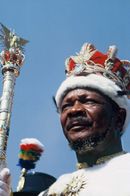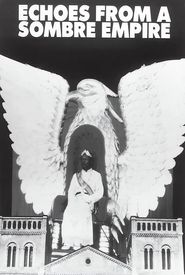Jean-Bedel Bokassa, the former president and self-proclaimed Emperor of the Central African Republic, was born Bokassa Mgboundoulou in Bobangui, a village in French Equatorial Africa, on February 22, 1921.
He was one of 12 children of a village chief, whose father was beaten to death by French officials due to his refusal to provide forced labor for a French company.
After his father's death, his mother committed suicide, and his father's family sent him to a nearby school run by Christian missionaries, where he became enamored with the works of French author Jean Bedel.
The missionaries wanted Bokassa to become a priest, but he was sent to another school in Brazzaville upon realizing he had neither the aptitude nor the inclination to become one.
He graduated from the school in 1939 and was advised by his relatives to join the Free French Army, which he did in May.
He rose through the army ranks quickly, taking part in the capture of Brazzaville and seeing combat in France and Indochina, where he was awarded several medals for bravery.
After the war, he stayed in the army, eventually becoming a colonel and being appointed to head the army of the Central African Republic.
However, family ties did not prevent tensions between Bokassa and President David Dacko, who was also his cousin.
In December 1965, Bokassa led a coup that unseated Dacko, and he took control of the country on January 1, 1966, dissolving Parliament and promising elections "soon".
Conditions in the country improved initially, but soon sank back into corruption and poverty, with Bokassa's extravagant spending exacerbating the situation.
He narrowly missed being deposed in a coup in 1969 and reportedly had the coup's ringleader, a former army colleague and cabinet minister, killed.
In 1972, Bokassa declared himself president for life, narrowly avoiding being overthrown in a coup in 1974.
In 1977, he declared himself Emperor Bokassa and changed the name of the country to the Central African Empire, having himself crowned in a lavish coronation ceremony that cost around $20 million.
Conditions in the country became so bad that France withdrew support from his regime, and Bokassa turned to Libyan dictator Muammar Gaddafi for support.
In an effort to secure Gaddafi's support, Bokassa converted to Islam and changed his name to Salah Eddine Ahmed Bokassa, but "reconverted" back to Catholicism and went back to using his own name when funds promised by Gaddafi never materialized.
In 1979, food riots erupted in the capital, and Bokassa's forces opened fire on protesters, killing hundreds.
In April of that year, his government arrested hundreds of schoolchildren who refused to buy uniforms with Bokassa's picture sewn on them, resulting in the deaths of around 100 children.
The incident caused international outrage, and Bokassa's regime became even more repressive.
In September 1979, French troops invaded the country, and Bokassa escaped, fleeing to the Ivory Coast, where he lived in exile for four years before moving to France.
In 1986, he flew back to the Central African Republic, was arrested, and soon placed on trial, where he was found guilty and sentenced to death, but the sentence was commuted to life in solitary confinement.
He was released in 1993 during a general amnesty and died in Bangui, Central African Republic, in 1996 of a heart attack.
















